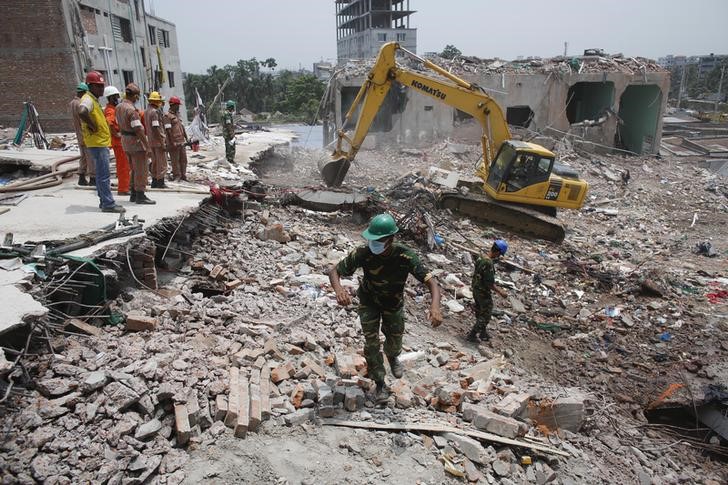By Serajul Quadir
DHAKA (Reuters) - Some 220 garment factories have shut down in Bangladesh with the loss of up to 150,000 jobs after the collapse of Rana Plaza shone a light on unsafe working conditions in the ready-to-wear industry, triggering a wave of inspections, according to a report on Saturday.
More than 1,100 workers were killed when the building collapsed in 2013, creating urgent demands for global retailers to do more to ensure the safety of their workers in Bangladesh, the world's second biggest garment exporter after China.
Since then, the $24 billion industry has been in the throes of a massive safety overhaul, with more than 2,000 of 3,500 exporting factories inspected by the government or as a result of retailer-led initiatives.
German-based NGO Transparency International Bangladesh (TIB)said many factories had closed down because they failed to meet the stricter safety measures and better terms for their workers, or due to a fall in orders.
It carried out a research between April 2014 and March 2015 which revealed that the rate of factory closures was nearly four times that of the previous year, while job losses had tripled.
"The factories, especially small and medium-sized factories were closed during this time due to cancellation of work orders from the buyers and lack of compliance," TIB Executive Director Iftekhar Uzzaman told Reuters.
"It is feared that if the process continues, up to 700,000 workers may face loss of jobs."
The government has rejected the survey results, saying most of the closures were among the sub-contractors.
"A number of factories were shut down, but those are small factories and did not have direct buyers," Mikail Shipar, secretary at the Ministry of Labour and Employment, told Reuters.
"At the same time, the compliant factories who have ISO certificates continued to expand due to good business," he said, adding these had absorbed some of the workers who had lost their jobs.
Iftekhar said that while 95 percent of factories had implemented the new minimum wage requirements, there had been complaints of irregular payments and pressure on the workers to raise their productivity by 60 percent.
He also cited lack of accountability to monitor the activities of the inspectors, and lack of transparency in handling a $19 million fund collected from buyers and international organizations to help toward worker compensations.

Fourteen brands, including JC Penney (N:JCP) and Carrefour (PA:CARR), which traded with factories based in Rana Plaza had not contributed to the fund, while Wal-Mart (N:WMT) had donated only $1 million, much less than expected, Iftekhar said, quoting the TIB report.